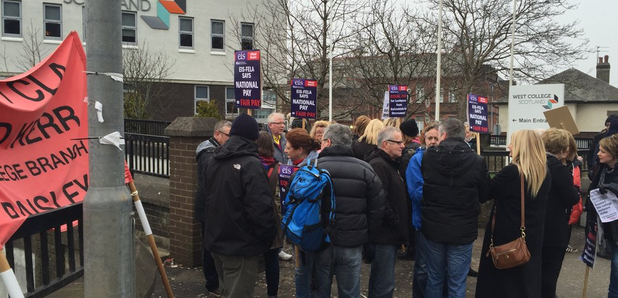Lecturers Urged To Suspend Strike Action Over 'Unreasonable Pay Demands'
5 February 2019, 07:38

A union has been accused of making "unreasonable pay demands" in its campaign to raise the salaries of college lecturers.
Members of the Educational Institute of Scotland Further Education Lecturers Association (EIS-FELA) were balloted in December and voted overwhelmingly to take strike action.
Lecturers went on a 24-hour strike on January 16 and are striking again on Tuesday, with further strikes planned for Wednesday March 6 and Thursday March 21.
It is the third time in four years industrial action has been taken by the union.
John Gribben, of Colleges Scotland Employers' Association, said the union should suspend industrial action while pay talks continue.
"It is disappointing that the EIS-FELA has not suspended strike action whilst negotiations are ongoing," Mr Gribben said.
"We have met with the EIS-FELA on 10 occasions to discuss pay and will be meeting them again on Thursday to try to end this disruptive strike action.
"The EIS-FELA is aware that colleges are already having to make cuts to finance the additional pay offer which they have rejected.
"Their unreasonable pay demands would mean fewer courses, fewer students and fewer lecturing jobs in the college sector.
"As we have repeatedly said to the EIS-FELA, the pay increases over 2017-20 from harmonisation are directly connected to the current additional pay offer on the table over the same three-year period and cannot be separated - a pay rise is a pay rise irrespective of where it comes from."
Colleges Scotland indicates the current combined pay deal on offer would increase national average pay by more than 12% (or more than £4,000) between 2017-2020.
Mr Gribben added: "College lecturers in Scotland are by far the best paid across the UK. Any deal must be affordable and sustainable for the sector and the EIS-FELA should recognise how strong the overall package for lecturing staff is.
"Not only are lecturers benefiting from significant pay rises, they have also seen substantial improvements in their terms and conditions, including 62 days' annual holiday, a reduction in weekly contact with students to 23 hours, and excellent pensions provision.
"Despite considerable increases in pay and improvements in terms and conditions, this still isn't enough for the EIS-FELA.
"It remains within the gift of the EIS-FELA to suspend strike action and end this unnecessary disruption to students, who are losing out the most."
EIS general secretary Larry Flanagan said the union had made an offer to suspend strike action as part of its proposals.
"In hope of reaching a negotiated agreement, the EIS recently submitted an amended proposal which we believed would be likely to break the impasse," Mr Flanagan said.
"At the time of submitting this proposal, we also offered to suspend Tuesday's strike action. Sadly, this offer was not taken up by Colleges Scotland.
"It is disappointing that Colleges Scotland seems content to allow further strike days happen rather than seeking to settle this dispute."
The EIS indicates its amended pay claim for lecturers (based on the Scottish Government's public sector pay policy for the period 2017-20) mirrors the pay deal agreed between Colleges Scotland and support staff unions.
A deal for a minimum pay rise for support staff of £1,600 over a 29-month period was agreed in October last year.
Mr Flanagan suggested it is not credible for Colleges Scotland to claim a deal for support staff pay rises is possible but a deal for lecturers is not.
He said: "The EIS is asking only for a fair cost of living increase, similar to that already awarded to college support staff and also in-line with public sector pay policy.
"Management's claims of unaffordability of our claim have already been shown to be based on some rather questionable calculations.
"The actual costs of the award to support staff and our pay claim for lecturers are practically identical, yet Colleges Scotland continues to push the fantasy that one claim is affordable and sustainable while the other is unaffordable and unrealistic.
"The 2017 NJNC Agreement delivered harmonised pay for lecturers throughout the college sector, and some national conditions of service.
"It established equal pay for equal work and was not a cost-of-living pay uplift. Seeking to conflate the issues is disingenuous at best."






















